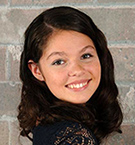 Hi y’all! My name is Miranda Foster and I am a senior from Raleigh, North Carolina. This May, I will be graduating with a major in Psychology and minors in Chemistry and Neuroscience. To perfectly cap my time at Carolina, I am interning at TEACCH Autism Program through the Gil Internship. I am currently assisting Dr. Laura Klinger, the director of TEACCH with pre- and post-intervention data entry for her latest study. In this study, known as T-STEP, we provide the necessary tools for success in future employment and post-secondary education for students on the autism spectrum at Wake Tech. Specifically, students attend a supplemental class focused on improving skills like emotional regulation and executive functioning. As my personal research interests include improving outcomes for adults with developmental disabilities, I am stoked to gain a glimpse into the world of autism research.
Hi y’all! My name is Miranda Foster and I am a senior from Raleigh, North Carolina. This May, I will be graduating with a major in Psychology and minors in Chemistry and Neuroscience. To perfectly cap my time at Carolina, I am interning at TEACCH Autism Program through the Gil Internship. I am currently assisting Dr. Laura Klinger, the director of TEACCH with pre- and post-intervention data entry for her latest study. In this study, known as T-STEP, we provide the necessary tools for success in future employment and post-secondary education for students on the autism spectrum at Wake Tech. Specifically, students attend a supplemental class focused on improving skills like emotional regulation and executive functioning. As my personal research interests include improving outcomes for adults with developmental disabilities, I am stoked to gain a glimpse into the world of autism research.
My fascination with the human mind is due in large part to my older brother, Nolan. When I was little, my brother confounded me. He would eat candles, hated boisterous crowds, and never spoke a word. Whenever I asked my parents why my big brother acted more like a younger brother, they always responded that he had autism, a type of “boo-boo” in his brain. As I grew older, I met other people in the special needs community and realized that autism spectrum disorder was not the only “brain boo-boo” out there. This experience inspired me to investigate the mechanisms behind developmental disabilities and seek solutions to the daily challenges they pose.
Although I have been working at TEACCH for just under a month, I have already learned so much about research on autism. So far, I have gained a better understanding of the challenges for transition age youth on the spectrum by reading the literature and reviewing the data with researchers at TEACCH. In addition to learning about the need for studies like T-STEP, I am also more aware of the types of assessment for transition-age youth on the spectrum. In particular, I will learn more about how to behaviorally code JSAP from recordings of pre- and post-intervention assessments. As I hope to one day base my career on providing assessments after I become a clinical neuropsychologist, this experience is not only exciting, but also preparation for my future career.
In summary, I am thrilled to be a part of TEACCH and cannot thank the Gil Internship enough for providing me with this opportunity. Through my time at TEACCH, I will not only gain a better understanding of clinical research for autism, but will also learn valuable skills, such as administering and scoring standardized and observational assessment measures. Furthermore, the mentorship provided by Molly Corrigan and Dr. Steve Buzinski will help me reflect on my time at TEACCH in order to gain the most out of my experience. I am sure that this internship will provide me with the tools I need to succeed in graduate school and beyond.
